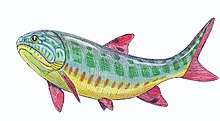Acrolepis
Acrolepis (Ancient Greek for "Tip Scale") is an extinct genus of prehistoric bony fish that lived from the Tournaisian stage of the Mississippian epoch to the Late Permian.[1] It is a large piscivorous predatory fish in the acrolepid family, which occupy an apex predator niche in its locale. Measured from the fossil specimen discovered in Germany, the species was estimated to have grown up to 3 metres (9.8 ft) in length, making it one of the largest predatory fish of the Tournaisian and Permian.
| Acrolepis | |
|---|---|
 | |
| Restoration | |
| Scientific classification | |
| Kingdom: | |
| Phylum: | |
| Subphylum: | |
| Infraphylum: | |
| Superclass: | |
| Class: | |
| Subclass: | |
| Order: | |
| Family: | |
| Genus: | Acrolepis |
Fossil Record
The current specimen of Acrolepis is in possession of Tyne & Wear Archives and Museums. The fossils that were found were a fossilized jawbone in the Marl Slate of the Late Permian (Durham Province). This genus of fish does not have any extant relatives that can be traced from its origin, due to lack of remains.
Diet
The Acrolepis pursued a wide range of small Permian fish (most primarily Palaeonisciformes), sarcopterygans, ammonites, crustaceans, small eurypterids, bivalves and tiny invertebrates. It used its teeth similarly to the pike, holding slippery, scaly prey in place and pulling edible material into smaller pieces for whole consumption. It was a solitary hunter, relying on its size alone to overcome prey, and be the sole individual to consume prey. Natural threats to this creature were minimal, as other predatory creatures larger than itself (such as Sarcoprion, a eugeneodont of the same period) were heavily isolated and distanced from this creature, allowing it free rein in its environment.[3]
See also
- Prehistoric fish
- List of prehistoric bony fish
References
- Sepkoski, Jack (2002). "A compendium of fossil marine animal genera". Bulletins of American Paleontology. 363: 1–560. Archived from the original on 2011-07-23. Retrieved 2009-04-24.
- "Acrolepidae". Paleobiology Database. Retrieved November 17, 2012.
- http://www.twmuseums.org.uk/geofinder/search/item.php?record=NEWHM:2004.H61%5B%5D Geofinder Marl Slate, Record Number: NEWHM:2004.H61